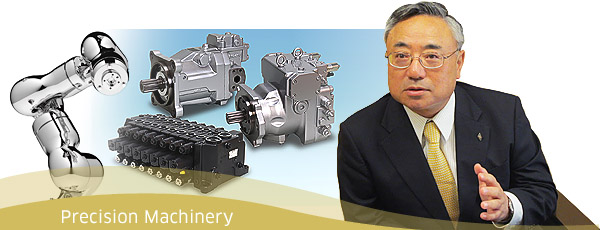Precision Machinery Company

Kazuo Hida
President,
Precision Machinery Company
President,
Precision Machinery Company
Aiming to Become Top Brand in Motion Control

- How does motion control as a field contribute to society?

- I believe precision machinery and robots contribute to society and the environment in three ways.
- Moving an object quickly, accurately, and efficiently, according to the will of the operator. This capability adds an excellent quality to the products of our customers (excavators, production lines, and other machinery), allowing both our customers and the Company to carry on our businesses and coexist with society on a sustainable basis.
- Energy conservation and environmental contributions. If we take excavators for example, hydraulic pumps convert the mechanical energy produced by an engine into hydraulic energy, and are thus responsible for the overall efficiency of the machine. The ability to move efficiently with minimal waste is in itself a sign of superior energy efficiency, and also results in minimal CO2 emissions. This year, we launched a new series that improved fuel efficiency by another 3%. In 2011, some 280,000 excavators were sold around the world, which is greater than in any other year. Of these, about 180,000 were equipped with our hydraulic pump. That adds up to a share of 64%. Let's say there are two million excavators currently in operation around the world. I think it is safe to say that about half of those are equipped with our hydraulic pumps. If we replaced all of those with our new pump which helps reduce fuel consumption by 3%, that would translate into a reduction of about three million tons of CO2 emissions per year.
- Establishing the infrastructure of emerging economies. For example, we are seeing Chinese-made excavators powered by Kawasaki's hydraulic equipment used to develop the infrastructure of India and other countries. Robots are employed on automotive production lines around the world, helping reduce manufacturing costs. This will create increased opportunities for people in emerging economies to own a car.

- Precision Machinery Company is doing business around the world, and you yourself have spent many years abroad. What have you learned from that experience, and how do you intend to utilize that experience in your work as President?

- When you have offices and factories all over the world, you need to embrace different cultures and values. However, I want to ensure that all of our employees share a sense of loyalty to the Company and a deep commitment to our craft. I would like to manage the Company so that employees who have spent many years with us will be glad that they have worked for us.
To that end, we must not fall into the trap of thinking that how we think and do things in Japan is the one and only way. We must first understand and accept cultural differences. It is also necessary to clarify the purpose and reasoning behind what we do—which tend to be omitted when dealing with fellow Japanese—and to manage them thoroughly.
With regard to differences in work style, I have seen many workers in the U.S. making arrangements and working efficiently from the morning in order to be able to get off work at 5 p.m., and also get far more work done than others who spend longer hours at the office. On the other hand, there is a corporate climate in Japan in which staying longer at the office is seen as an end or a value in itself. Such attitudes are hindering efficiency. In order to change this type of climate, we have to send managers abroad to transform their attitude by having them experience work in a foreign country. I have also seen examples in which a top executive who was invited to Japan from the U.S. gradually changed the corporate culture.
That said, I must give credit to those engineers who work late into the night, butting their heads against challenging problems. I believe a diverse form of management in which people like these and engineers working reduced hours who can come up with an effective idea while nursing their child can both coexist is what we truly need.

- What kind of challenges are you planning to tackle next?

- I will work towards integrating the hydraulics business with the robotics business. Instead of thinking about them as separate fields, we will aim to become top brand in the field of motion control by meeting the needs of customers in an integrated manner. Also, we will strive to achieve further energy savings and environmental contribution by creating hybrid products that combine hydraulics with electric power, and by developing hydrogen gas valves for fuel-cell cars.
In the robotics business, we will go beyond motion control by introducing artificial intelligence, developing applications for fields that are lagging behind in automation. We will also make inroads into the field of medical robots.
At present, we must deal with the issue of economic fluctuation in China. To ensure our factories in each country remain productive, we are accelerating our development efforts for the mobile field, instead of simply waiting for the market to recover.
Contact
If you need more information about our business,
please feel free to contact us.





